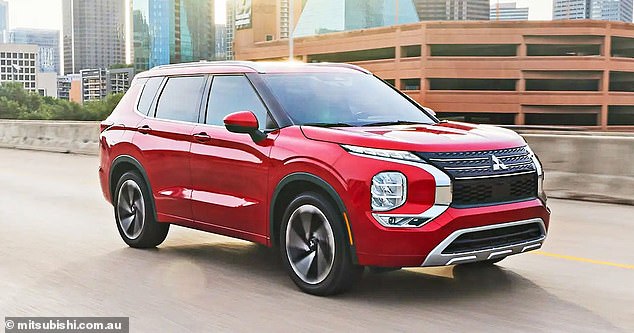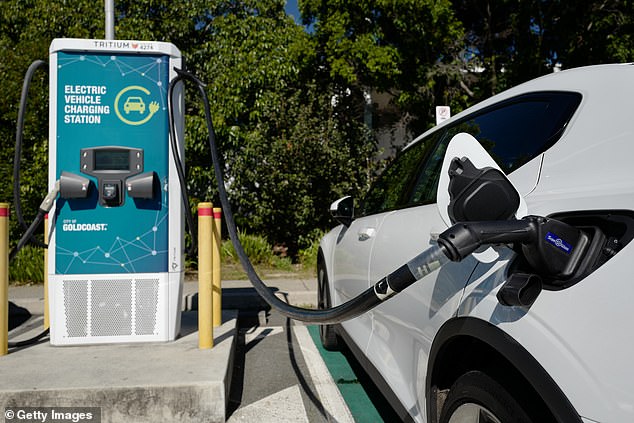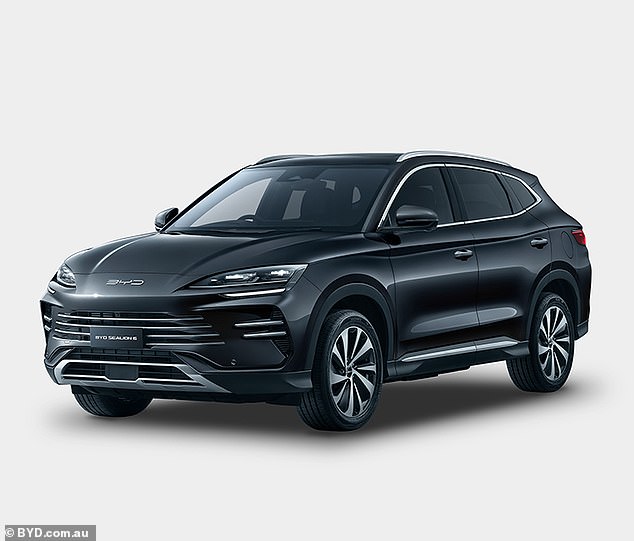The scrapping of a major tax exemption could change the face of Australia’s electric vehicle industry forever – and cost EV drivers thousands of extra dollars.
From April 1 2025, the Fringe Benefits Tax (FBT) exemption on plug-in hybrid vehicles (PHEVs) will be axed.
Under the FBT law, PHEVs will no longer be considered zero or low-emissions vehicles and only fully electric vehicles will be eligible for the exemption.
PHEVs have a combustion engine and a battery and electric motor, but have a much larger battery unlike regular hybrids.
The exemption on the FBT had previously applied to the personal use of electric vehicles financed under a novated lease or operated by a business.
This impending change is coming at a crucial time for the EV industry CarExpert.com.au founder Paul Maric told Yahoo Finance.
‘While people are now switching away from electric vehicles to plug-in hybrids, it’s the worst time possible for this kind of thing, because the people just don’t want to buy electric vehicles and they’re going to be removing the only real subsidy that is currently sort of gaining traction,’ Mr Maric said.
The imminent FBT change could also see the second-hand market flooded with PHEVs, as owners look to offload their vehicles.


Director of Content at Drive James Ward told Daily Mail Australia he expected to see a rise in sales of PHEVs and EVs as more people understand the savings they can achieve using a novated lease.
‘For example, so far this year BMW has sold nearly as many i4 electric sedans as it has 3 Series – its staple midsize executive sedan.’
‘Once the FBT exemptions end though, buyers may re-evaluate their decision, especially for electric,’ Mr Ward said.
‘If you need to pay 20 per cent more for an electric over an equivalent petrol car, the financial benefit just isn’t there for a lot of buyers. Especially if you cannot charge easily at home.’
He added, ‘some of the benefits of the PHEV models, mated with the closer pricing to petrol models, may continue to win buyers over.’
‘Pure hybrid sales, which do not receive the FBT exemption, are growing at a significant rate (up 87 per cent year-on-year) due to the hip-pocket savings in their daily use,’ Mr Ward said.
Compared to other engine types, fully battery-powered electric vehicles (EVs) have been extremely popular in Australia in recent years.
Fewer than 3,000 EVs were sold in Australia in the second quarter of 2022, according to the Australian Automobile Association (AAA).
The FBT exemption for electric cars came into effect on 1 July 2022, EV sales jumped to more than 25,700 in the second quarter of 2023, Yahoo reports.
Sales have stalled since then, with only 25,353 EVs sold in Q2 of this year.
Meanwhile, sales of plug-in hybrid vehicles have been gaining momentum, with 1,894 sold in Q2 of 2022 and 4,675 sold in Q2 of 2024.
From the start of January to the end of September 2024, PHEV sales have skyrocketed by 120.5 per cent compared to the same period last year.
This is compared to hybrids (up 87 per cent) and EVs (up 6.6 per cent).

The motor industry is pushing for the FBT exemption on PHEVs to be extended.
Rohan Martin, chief executive of the National Automotive Leasing and Salary Packing Association, believes PHEV sales will plummet as a result.
‘Without that incentive in place, we think there will be a significant drop in sales, plus those who have been considering moving to some electrified vehicle, we think it’s likely to dis-incentivise them, particularly if they are wanting a larger type of vehicle,’ Mr Martin told the ABC.
Motor Trades Association CEO Matt Hobbs said the government should rethink its decision to scrap tax benefits for plug-in hybrids.
‘The government has set a challenge for the industry to decarbonise… Now they’ve got it, we need to give industry the tools and consumers to be incentivised.’

